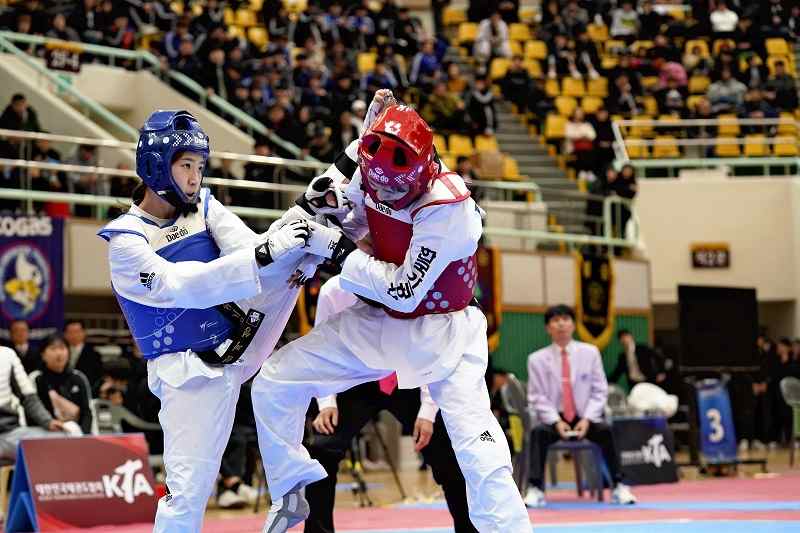
Sim Jae-young, left, fights in a match in January 2020, prior to the start of the pandemic.
11:12 JST, May 27, 2021
This is the third and final installment in a series examining other countries’ efforts to prepare for the Tokyo Olympic and Paralympic Games.
As Sim Jae-young prepares as best she can for the Tokyo Olympics, one of her biggest worries concerns a YouTube video.
The video shows details of the South Korean taekwondo competitor executing her specialty leg techniques during a match in January 2020, in which she secured her place on South Korea’s Olympic team in the women’s 49-kilogram class.
Among top-level athletes, studying videos of their rivals is common. But for the 25-year-old Sim, time has stopped for more than a year, putting the Chuncheon, South Korea, native at a perceived disadvantage.
Sim, who is ranked No. 2 in the World Taekwondo Olympic rankings, has been unable to participate in any tournaments at home or abroad since the start of the pandemic. Not only has that deprived her of a chance for live competition, but also of a chance to scout rivals from other countries.
“I have to add changes to my leg techniques,” said Sim, who is aware that she has given time for rivals to study her techniques using the posted video that anybody can see.
South Korea had named Sim and the others to the Olympic team in its national sport at an early stage as a way of setting up ideal conditions for the team to prepare for the Tokyo Games.
However, the pandemic is affecting efforts by the athletes to be in peak condition for the Olympics.
“The athletes who adjust to the situation better may really shake things up,” said Choue Chungwon, 73, president of World Taekwondo, the governing body of the sport.
This is not limited to contact sports.
Usually, athletes calculate backward from the time of a major competition in order to be at their mental and physical peak at just the right time. But the coronavirus had made peaking difficult, which has been reflected in recent results in sports that are based on times such as swimming and athletics.
In 2019, which would have been the year preceding the Tokyo Olympics, 12 swimmers in the men’s 100-meter freestyle clocked times under 48 seconds, while 19 men broke 10 seconds in the 100 meters in athletics. Last year, there were just one and four, respectively, who achieved those times.
Of course, many top-level international events were canceled last year, so it is only natural that results were below par. But in the case of Melissa Bishop, a 32-year-old Canadian who finished fourth in the women’s 800 meters at the 2016 Rio Olympics, deviation from her usual process of peaking greatly affected her performances.
Bishop’s personal best in the event is 1 minute 57.01 seconds, which is the Canadian national record. But it wasn’t until early May this year that she finally topped the Olympic qualifying standard, which is about 2.5 seconds slower.
Bishop lives in Ontario Province in eastern Canada, but when a coronavirus surge hit there in the middle of January, she was forced to move out west, where she lived about three months while looking for places to train. It was a less-than-ideal situation to prepare for an Olympics.
Athletics Canada, the nation’s governing federation in sport, will hold nine meets in June around the country for its Olympic-bound athletes as venues for making their final preparations for the Tokyo Games.
But Bishop voiced concern about whether she will be able to reach a level high enough to win a medal in Tokyo.
Athletes are preparing under unprecedented and difficult circumstances. Even so, they are forging ahead to perform at their best, or as close as they can get to it.
Undaunted athletes continue difficult prep for Tokyo Games
The adversity brought on by the novel coronavirus global pandemic has had considerable impact on athletes worldwide in their final preparations for the Tokyo Games.
Russian’s dual concerns: Doping, virus
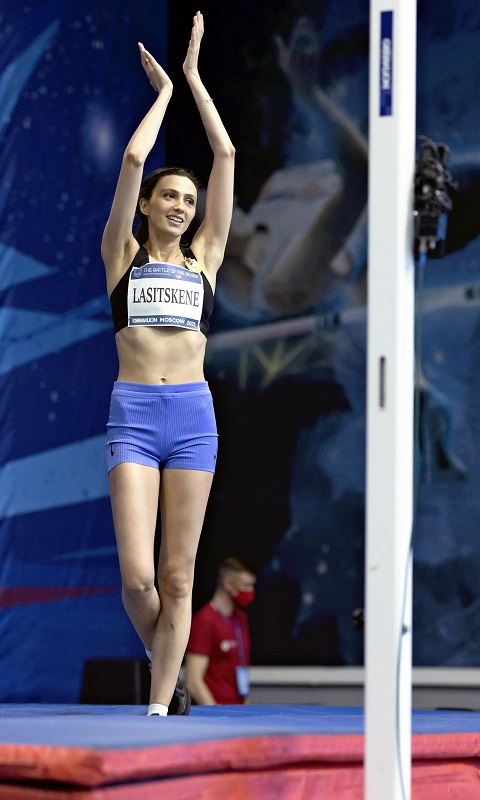
Russian high jumper Mariya Lasitskene claps her hands to garner support from spectators during a competition.
“It’s hard. My nerves are wearing thin.”
Those are the words of Russian three-time defending World Champion women’s high jumper Mariya Lasitskene, 28, who has been working toward the Olympic Games. Her preparations have been shrouded in hardship because of two concerns: the impact of the novel coronavirus and the systematic doping scandal involving Russian athletes.
Her training facilities were forced to close from March to June last year as part of the restrictions on how much people were allowed to venture outside, and that impacted her efforts. Under instructions from her coach, she continued training, including strengthening exercises, in the hallways of her home.
Starting earlier this year, she was finally able to begin practicing her jumps at training facilities. But she has come to realize how difficult it is to get preparations done by herself before the Games.
In addition to those difficulties, she has been unable to take part in any major international competitions since October 2019 because of the ongoing ban by the World Athletics on its membership of Russian Athletics, the Russian national body.
She was reinstated on April 30 under the status of “authorized neutral athlete” by the international governing body of athletics, allowing her to take part — in an individual capacity only — in international competitions, including the Tokyo Olympics.
However, she has to regain “the feel of competition against high-level rivals as well as my form,” by appearing in international meets over the remaining two months ahead of the Olympics.
As part of her efforts toward taking part in competitions abroad and in the hope of “containing her concern” over a higher risk of infection through jumping at international events, she dared to get the coronavirus vaccination. She had been wary of it for long, fearing the impact it might have on her overall condition.
“We won’t be discouraged.” She hopes she can convey these feelings to her fellow athletes by having a spectacular showing at the Games.
Kenya: Top marathoners can’t work on tactics
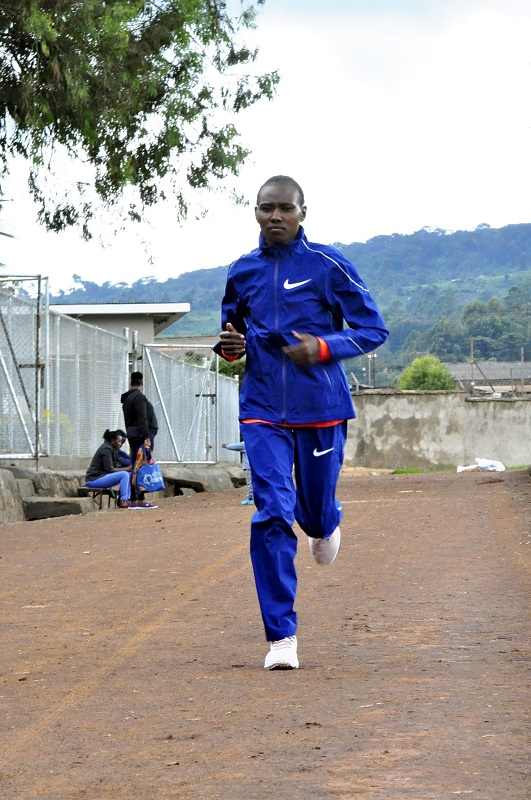
Ruth Chepngetich, a Kenyan runner who will take part in the women’s marathon event at the Tokyo Games, continues her preparations in Kenya.
Kenya is a country that takes pride in its domination of long-distance running events. Ruth Chepngetich, a 26-year-old considered a heavy medal favorite in the women’s marathon, has her training base in Ngong, located in a mountainous region about 2,000 meters above sea level and accessible with a one-hour drive from Nairobi.
When it rains, the track gets muddy, and at other times, shopping bag-toting locals traipse across the premises.
Issues that loom larger than these training hurdles, however, are the measures taken by her country against the coronavirus. Although a marathon is an event in which runner tactics taken in groups greatly affect the outcome of a race, the teams have been banned from working out together in large numbers.
Chepngetich won the marathon title at the world championships in Doha in 2019 and smashed the women’s half-marathon world record in 1 hour 4 minutes 2 seconds in Istanbul in April.
She proclaimed definitively: “Running is my life.” Chepngetich has also participated in an event in Japan before and hopes to put on her best performance in front of fans here because of the positive impression she was left with after the shouts of encouragement from spectators who lined the route back then.
Brazil: Judoka, tests positive, team barred
Eduardo Yudy Santos, a 26-year-old provisional selection to the Brazil judo team in the men’s under-81-kilogram category, was unable to take part in an international competition in Georgia in March because his roommate was infected with the coronavirus prior to the event, rendering Santos out as a close-contact risk.
When he went to Turkey to take part in another competition, he himself tested positive and left the entire team, which took the same flight, unable to participate in the event.
Not only was he confined in a hotel room for 15 days, he was also unable to take part in the international judo championships held in mid-April in Mexico.
He lived in Japan until he was 19, and his parents still reside in Shimotsuma, Ibaraki Prefecture. While he is keen on taking part in the Tokyo Games, his first Olympics, he also has concerns that he has been “unable to take part in consecutive competitions where I was supposed to test my self, making it difficult to get into shape.”
China: Triathlete confident about adjusting
Zhong Mengying, 31, who will represent China in the women’s triathlon at the Tokyo Games, has a French coach. As the coach has been unable to enter China because of strict border control measures taken by Beijing to contain the spread of COVID-19, instructions have been conveyed for quite some time via online sources.
Said Zhong: “I had pretty much been worn down mentally several times” as there were no competitions and just continual training sessions for a lengthy period. The French coach sympathized with her state of mind online and supported her, for instance, by loosening up a training schedule that had a tendency to be too rigid. Zhong said she feels that she was able to “weather” a difficult phase.
She won the Asia Triathlon Championships held in Hiroshima Prefecture in April and is a provisional selection to China’s team at the Tokyo Games.
Zhong has also experienced the quarantine and checkups for those involved in the competition that were conducted under the assumption such circumstances will occur during the Tokyo Olympics.
“I’m sure I will be able to make adjustments during the Tokyo Games better than athletes [who did not take part in the Asian Triathlon Championships] from other countries,” Zhong said.
Filipino pole vaulter stranded in Italy
Ernest John Obiena, a Filipino pole vaulter, cleared 5.86 meters in the men’s event during a competition in Poland in February, setting the Philippine national indoor record.
As he has been stranded in Italy, where he has his training base, the 25-year-old has been unable to return home for about 1½ years. Because of the restrictions last year on outside movements, he could not use the training facilities for about two months. By doing muscle-building work at his home in Italy, he has strengthened other areas of his body.
Since the moment the Tokyo Games were delayed last year, he has looked at the postponement positively, considering it this way: “I was given more time to strengthen myself physically.”
Top Articles in Sports
-
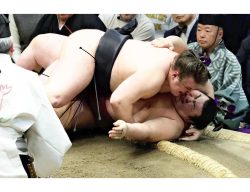
Aonishiki Tops Atamifuji in Playoff to Win New Year Grand Sumo Tournament in Ozeki Debut
-

Milano Cortina 2026: Figure Skaters Riku Miura, Ryuichi Kihara Pair Win Gold; Dramatic Comeback from 5th Place in SP
-

Milano Cortina 2026: Kokomo Murase Comes Out on Top After Overcoming Obstacles, Aiming for Greater Heights in Competition
-
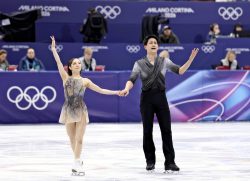
Milano Cortina 2026: Riku Miura, Ryuichi Kihara Clinch Japan’s 1st Gold in Pairs Figure Skating, Rebounding from Disappointing Short Program
-

Milano Cortina 2026: Olympics-Torch Arrives in Co-Host Cortina on Anniversary of 1956 Games
JN ACCESS RANKING
-

Japan PM Takaichi’s Cabinet Resigns en Masse
-

Japan Institute to Use Domestic Commercial Optical Lattice Clock to Set Japan Standard Time
-

Israeli Ambassador to Japan Speaks about Japan’s Role in the Reconstruction of Gaza
-

Man Infected with Measles Reportedly Dined at Restaurant in Tokyo Station
-

Videos Plagiarized, Reposted with False Subtitles Claiming ‘Ryukyu Belongs to China’; Anti-China False Information Also Posted in Japan






















